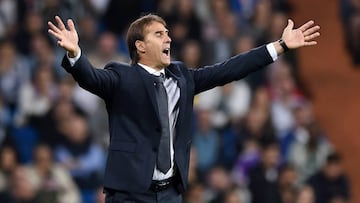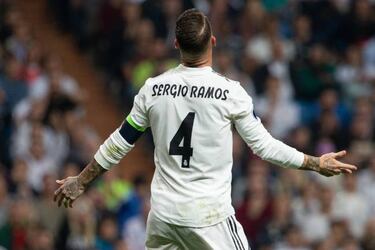Real Madrid: Five things to improve in Clásico at Barcelona
Ahead of a Clásico that's vital to Real's LaLiga chances and the future of their coach, AS takes a look at some of the things they must do better.

Real Madrid, and in particular their coach, Julen Lopetegui, face a sudden-death fixture in Sunday's Clásico, despite only being a handful of games into the LaLiga season. For Los Blancos, who find themselves four points adrift of leaders Barcelona and on a dreadful run (having lost to Sevilla, CSKA Moscow, Alavés and Levante in the past month), Lionel Messi's absence alone won't be enough to help them come away from the Camp Nou having avoided dropping seven points off the top and, who knows, saved Lopetegui's job at the Bernabéu.
If they are to leave with a result, they cannot afford to make the same mistakes that have proven their downfall in their first 13 games of the campaign and have cost them a UEFA Super Cup, left them outside of the European places and seen them booed off against Viktoria Plzen this midweek, despite being joint-leaders of their Champions League group. The finger is being pointed at the coach, but a squad of players performing well below their capabilities must also accept their share of responsibility for turning things around.
A defensive set-up that isn't nearly tight enough
Real have scored 20 and conceded 15 in their 13 games this term. Despite coming up against a clearly weaker side on Tuesday, they gave up 10 shots on goal, of which three were on target and more than a couple were gilt-edged, close-range opportunities. The defence has struggled to gel into a cohesive unit this season, partly because the team has not had a settled backline. Indeed, the Plzen game threw up a prime example of this instability: despite first-choice right-back Dani Carvajal being out injured, Álvaro Odriozola was restricted to a place on the bench, and it was a winger, Lucas Vázquez, who played in the position.
Too often, the centre-backs are sluggish to react to balls played into the men they're marking, while they're also suffering majorly when turned by passes in behind them. They are too slow to provide each other with cover and, when they do, it is generally inadequate; what's more, in anchorman Casemiro they're not enjoying the same degree of protection traditionally offered by a player who has always made a habit of dropping into the defence to help close off their opponents' passing channels. Real have managed to keep just four clean sheets this season and, more than anyone else, captain Sergio Ramos appears to be at the heart of the majority of Los Merengues' defensive calamities.

Full-backs who are overly obsessed by being wingers
The full-backs, meanwhile, are frequently out of position and, to make things worse, do not communicate with each other with a view to alternating their forward forays. Several times against Plzen, Lucas and Marcelo could both be seen haring into attack - in direct contradiction of what every defensive manual will tell you - and, as a result, the Czechs had few problems playing the ball out to either wing when they got it back - a pattern which then left Real's centre-backs horribly exposed on the counter. Last night's was the 11th home game in the side's last 14 in the Champions League in which they have conceded at least once.
Real Madrid are quick to commit numbers forward, but are very slow to get back into position in defence. This leads to a team that splits into two when their opponents transition into attack, allowing them acres of space to run into on the break. Whoever plays at full-back at the Camp Nou, they must seek a greater element of surprise when they join in the attack, and coordinate their forward runs with their counterpart on the opposite flank. Otherwise, the likes of Philippe Coutinho, Ousmane Dembélé and Luis Suárez will wreak havoc in behind them.
No balance in a midfield lacking tempo
Casemiro, Luka Modric and Toni kroos are all desperately out of form; that, in turn, is impacting heavily on a team which, as a whole, is lacking in zip. Although Lopetegui has sought to give the trio rests to enable them to gradually get back into their best shape, the World Cup is clearly taking its toll on them. The ball circulation is slow, they're not carrying it between the lines in a bid to break down the banks of players in front of them, and they're not getting back quickly enough when possession is lost. It feels like Real are never in control of games.
What usually sets Real Madrid's midfield apart is its ability to switch up the tempo, but so far this term neither Kroos nor Modric are able to engage that top gear. When he came on against Plzen, Fede Valverde seemed to be playing at another speed entirely. Last night, Isco was in front of the midfield three to inject more pace into Los Blancos' play and, above all, bring Gareth Bale and Karim Benzema into the play from central areas. However, the Andalusian's recent spell on the sidelines was noticeable: he didn't offer enough movement, was stodgy with ball at feet and ended up being substituted; it was becoming a long night for him.

Uneven pressing by players not buying into practice
Despite Lopetegui, as is his preference, looking to have his team defend high up the field, the midfield are winning back possession less freqently than they should - in part as a result of the fact that Benzema and Bale always seem to be simply waiting for the ball to beat their defensive line so that they can stroll around in anticipation of another attack. Real's pressing is carried out more out of obligation than because they truly believe in what they're doing.
What's more, the defence is not singing from the same hymnsheet, precisely because they are aware that the ball recovery further up the pitch is not as effective as it ought to be. Their lack of confidence in the pressing going on front of them means that they cannot resist seeking to cover their backs by dropping that little bit deeper than they should theoretically be. That leaves too much space between the lines, which is a hugely dangerous: if Real don't win possession straight back in their initial press, they are left hopelessly exposed on the break.
Individual errors in both defence and attack
Related stories
It doesn't matter what the line-up is, which system is used, who they're playing, or where. Individual errors are what are doing Real Madrid the most harm. In defence, when it isn't Marcelo in the Super Cup, it's Raphael Varane against Levante, Thibaut Courtois at Alavés, Ramos against Atlético, Girona, Sevilla, Plzen... And the midfield are certainly not blameless, either: Kroos' horrendous mistake in Moscow cost the team three points against CSKA. In attack, meanwhile, things aren't much better. Regardless of who of Bale, Benzema, Mariano Díaz and Marco Asensio get the nod, the goals have dried up in a big way, and the attack's profligacy ends up taking its toll, by not only letting the opposition off the hook but, in the process, allowing them to grow in confidence and, at times, make Real pay.
Real Madrid's total of 20 goals in 13 games this season is well short of the 27 they had managed at the same stage of the previous campaign. They need 13 shots to score one goal; if they want a result at the Camp Nou, that's an average they'd better bring down. Cristiano Ronaldo's departure has hurt them badly, because, whether they played well or not, the Portuguese's deadliness in front of goal would often settle the game for them. As Isco said on Monday, Real Madrid cannot spend their days crying over his absence; they probably should be spending their days finding someone who can dole out that same, cure-all remedy, though.
